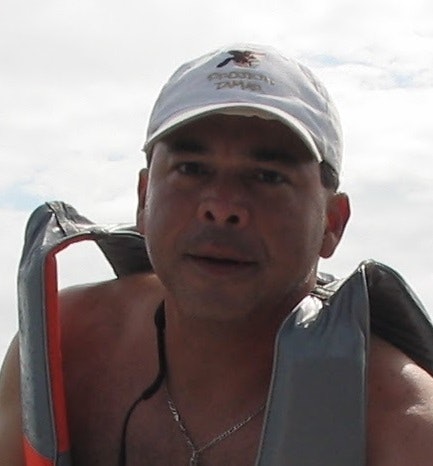Community action for the conservation of sea-turtles and their marine habitats in the Colombian Pacific, Colombia
Dr. Diego Amorocho (Associate Award Winner 2008) is Founder and Director of the Centro De Investigacion Para El Manejo Ambiental Y El Desarrollo (CIMAD), an NGO established in 2003 to protect endangered sea turtles and their habitats through community education, training, and livelihood development. With over 20 years’ experience, Diego is one of South America’s leading turtle researchers and a true conservation pioneer.
Thousands of turtles are killed in Colombian waters each year, caught incidentally on hooks or in nets, or as a traditional source of protein. Under these pressures, green, olive ridley, hawksbill and leatherback turtle numbers are declining rapidly; coupled with the destruction of beach nesting sites, sea turtles are facing extinction.
CIMAD’s approach to marine conservation puts people’s needs at the heart of all activities. Diego explains: “Local people are heavily reliant on fishing to support their families … I realised that if you want to protect turtles for the future, you have to work with people.”
Diego’s team is successfully changing local attitudes and raising awareness of the importance of conservation, whilst teaching artisanal fisherman ways to reduce turtle by catch. The introduction of turtle-friendly fishing practices, including special hooks and devices to help free trapped turtles, allow fishermen to catch more of what they’re really aiming for: “Local people acknowledged the benefits of conservation when they noticed that changing fishing gear is not only saving turtles but also increasing the size and value of target fish.”
CIMAD also teaches ‘turtle first aid,’ enabling fishers to treat and release caught turtles, rather than killing them for their meat and shells or to recover valuable hooks., Turtles needing specialist care are taken by fishermen to CIMAD’s Sea Turtle Rehabilitation Centre, which also offers community education, from basic literacy to mentoring the next generation of conservation scientists. Turtles released from the Centre are satellite tagged, the data analysed and learning publicised internationally; local schoolchildren enthused by learning about the turtles on their doorstep now follow the migration online.
Generating new local businesses is also important. In an initiative led by fishermen’s wives, plastic litter cleared from beaches is being turned into hand-woven bags and hats for sale, preserving turtle nesting sites and boosting incomes.
Now Diego is working towards the implementation of a Pacific regional action plan to secure a long-term future for turtles, coupled with an ambitious socio-economic programme designed to offset the cost to fishermen of releasing turtles.
Video about CIMAD’s Junior Volunteer Programme
PROJECT UPDATE
2022 CONTINUATION FUNDING
Community outreach to protect hawksbill turtles in the Colombian Pacific
£35,000 over 2 years
Colombia is facing a dramatic decline of hawksbill turtles on the Pacific coast, where poverty rates are above the national average and the species is most at risk. These areas have also been hit hardest by the impact of COVID-19, exacerbated by weak economic re-activation of fishing and tourism following the pandemic. The lack of employment opportunities has led people to turn to poaching, illegal fishing and collecting turtle eggs to survive.
CIMAD’s conservation projects were hit especially hard by a drastic increase in turtle poaching so Diego Amorocho and his team are working to re-engage communities on the importance of sea turtles and conservation post-COVID, while supporting local livelihoods.
They will design and launch a widespread public awareness campaign to educate people on the importance of protecting marine nesting and foraging hotpots, and will train over 75 fishers who work in Marine Protected Area (MPA) buffer zones in the region in responsible and sustainable fishing practices to reduce turtle bycatch while increasing the market value of their fish. Lastly, Diego will build technical capacity and provide green jobs by training local communities and state authorities on marine turtle monitoring, and will produce a standardised protocol to improve management of the region’s MPAs






